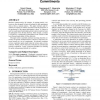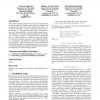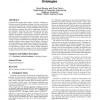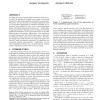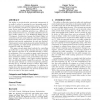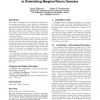122
Voted
ATAL
2008
Springer
15 years 2 months ago
2008
Springer
Distributed constraint optimization (DCOP) is a promising approach to coordination, scheduling and task allocation in multi agent networks. In large-scale or low-bandwidth network...
111
Voted
ATAL
2008
Springer
15 years 2 months ago
2008
Springer
Multi-agent systems benefit greatly from an organization design that guides agents in determining when to communicate, how often, with whom, with what priority, and so on. However...
112
Voted
ATAL
2008
Springer
15 years 2 months ago
2008
Springer
Business contracts tend to be complex. In current practice, contracts are often designed by hand and adopted by their participants after, at best, a manual analysis. This paper mo...
112
click to vote
ATAL
2008
Springer
15 years 2 months ago
2008
Springer
Coalitional games raise a number of important questions from the point of view of computer science, key among them being how to represent such games compactly, and how to efficien...
ATAL
2008
Springer
15 years 2 months ago
2008
Springer
Some natural epistemic properties which may arise in applications can only be expressed in standard epistemic logic by formulae which are exponentially long in the number of agent...
124
Voted
ATAL
2008
Springer
15 years 2 months ago
2008
Springer
Communication among agents requires a common vocabulary to facilitate successful information exchange. One way to achieve this is to assume the existence of a common ontology amon...
93
Voted
ATAL
2008
Springer
15 years 2 months ago
2008
Springer
We describe how to take a set of interaction traces produced by different pairs of players in a two-player repeated game, and combine them into a composite strategy. We provide an...
103
Voted
ATAL
2008
Springer
15 years 2 months ago
2008
Springer
We define the class of games called simulation-based games, in which the payoffs are available as an output of an oracle (simulator), rather than specified analytically or using a...
120
click to vote
ATAL
2008
Springer
15 years 2 months ago
2008
Springer
The ability to provide flexible, automated management of air traffic is critical to meeting the ever increasing needs of the next generation air transportation systems. This probl...
113
click to vote
ATAL
2008
Springer
15 years 2 months ago
2008
Springer
We consider a multiagent resource allocation domain where the marginal production of each resource is diminishing. A set of identical, self-interested agents requires access to sh...

